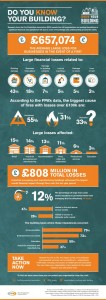Recently added item(s)
You have no items in your basket.

The Fire Protection Association (FPA) has launched a campaign for change to mark its 75th Anniversary year.
The ‘Know your Building’ campaign has three aims:
The campaign supports the conclusions and recommendations of the Hackitt Review, which highlighted a general lack of understanding of fire risks, mitigation and management arrangements by building owners and the construction industry. Despite Grenfell, many building owners remain unaware of the importance of maintaining the buildings’ fire protection systems and having them regularly inspected to ensure that they remain fit for purpose. As the FPA points out, no-one would want to work in a building without adequate COVID-19 measures in place, so why work in a building without the right fire safety measures?
Data collated and analysed by RISCAuthority on behalf of the FPA has revealed the significant financial impact on businesses and key services caused by fires.
An analysis of 4,782 major UK fires over a 10 year period between January 2009 and December 2019 where the financial loss was £100,000 or more, revealed a mean average loss of £657,074 per incident. The analysis focused on fires in buildings used by private and public sector organisations, and residential and mixed multiple occupancy shared ownership buildings.
Overall, loss values accounted for several areas, including damage to buildings (43% of the average value), interruption to business or services (18%), damage to contents (7%), damage to machinery or plant equipment (5%), loss of stock (5%) and loss of income or rent (2%).
Retail buildings were those most affected by large losses (15%), with 14% in industrial processing and manufacturing, 13% in accommodation buildings, 11% in pubs, bars and restaurants, 6% in the professional services sector, and 3% relating to education buildings.
Industrial processing and manufacturing buildings witnessed the largest overall financial impact through fires over the ten year period, with losses totalling £808m.
Jonathan O’Neill, managing director of the FPA, said: 'These findings reveal the significant risk that fires pose not only to lives but also to livelihoods. It is not just the direct financial impact that organisations need to consider - the loss of critical assets and data, ability to supply critical services including housing, reduced working hours, sourcing replacement premises and materials, brand damage, loss of customers to competitors as well as the general stress and knock to staff morale is equally costly. These factors can jeopardise the survival of businesses and essential services, and the people that rely on them.
'Many organisations wrongly assume that the law is there to protect their assets in the event of fire, but this is not the case - once fire and rescue services [FRSs] have evacuated building occupants they are not obliged to prevent loss of a building and its contents. We are urging organisations to go above and beyond their legal requirements in order to ensure they are more resilient to fire. This involves having a sound knowledge and understanding of a building including how it is constructed, the fire protection systems that are required and the competency of individuals responsible for installing and maintaining them.'
Over half of all the fires analysed (55%) were caused accidentally, but nearly a third were a result of arson (31%) – highlighting the vulnerability of buildings to factors beyond the control of those who manage them.
Commenting on the causes of fire and fire damage, Mr O’Neill said: 'While fires are generally caused accidently, organisations don’t anticipate arson being such a large factor. We also know that in times of recession arson rates tend to increase markedly – highlighting the importance of having proper systems in place to mitigate fire risk.
'We urge all organisations to ensure they have a robust fire strategy, with measures in place so that in the event of a fire the risk of entire building loss, and the financial and business impact this has, is reduced as far as possible. We have seen the lengths organisations have gone to make themselves COVID-19 secure, and fire protection requires the same level of attention as the risks are just as severe.'
The Fire Protection Association is passionate about improving the quality of the built environment, and its goal is to make it a safer place to live and work by helping building owners and managers achieve stronger business resilience when it comes to the threat of fire. Further resources can be accessed at www.thefpa.co.uk/news/fire-safety-advice-and-guidance
Fire Depot has been the UK's favourite fire safety supplier for over 50 years. We are open for business and here to support the fire trade in keeping buildings and people safe. Our experienced team can offer advice and guidance about any product or fire safety application. For expert help and advice, please contact the Fire Depot team on 0330 999 2233, email us at sales@firedepot.co.uk or visit www.firedepot.co.uk to see our full range of fire safety products.